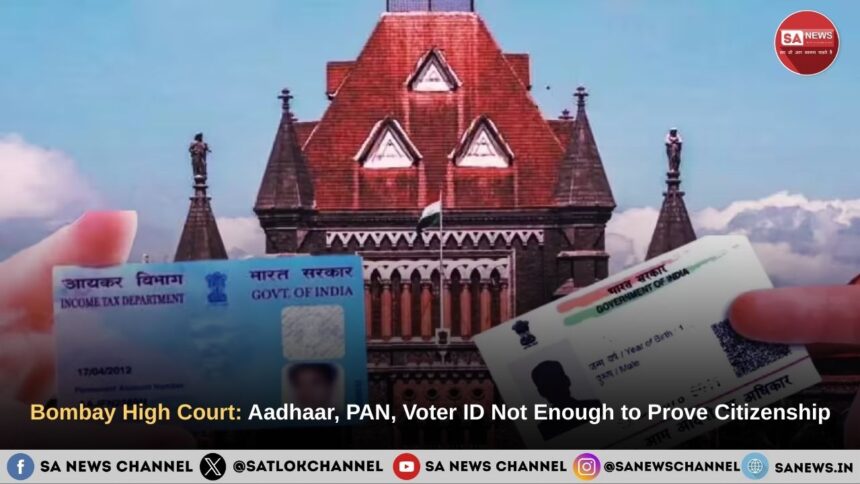In a landmark judgment, the Bombay High Court has declared that Aadhaar card, PAN card, and Voter ID—commonly used documents in India—cannot, by themselves, establish Indian citizenship. Issued during the denial of bail to a man accused of entering the country illegally, the ruling underscores that identity documents intended for services cannot bypass the legal procedures laid down in the Citizenship Act, 1955. This verdict is a reminder that claiming Indian nationality requires more than possession of these widely-held documents.
- Context & Case Overview
- Key Legal Takeaways
- 1. Identity ≠ Citizenship
- 2. Citizenship Must Be Proven Under Citizenship Act, 1955
- 3. Burden of Proof Falls on Individual If Credible Evidence Against Citizenship Exists
- Why This Matters—for You, the Citizen and Resident
- Broader Legal and Social Implications
- Why Only the Right Path Leads to Acceptance—in Law and in Heaven
- Frequently Asked Questions (FAQs)
Context & Case Overview
The decision emanated from a bail hearing of Babu Abdul Rauf Sardar—alleged to be a Bangladeshi national who entered India illegally and obtained several Indian identity documents through allegedly forged documents. Authorities claimed he used these to alienate his true nationality and assert false Indian citizenship. The court rejected his bail plea on grounds of potential tampering with evidence and national security concerns.
Key Legal Takeaways
1. Identity ≠ Citizenship
Justice Amit Borkar emphasized that documentation like Aadhaar, PAN, Voter ID—even a passport—is for identification or service access, not proof of citizenship. The court reaffirmed that these documents alone lack legal teeth for asserting nationality.
2. Citizenship Must Be Proven Under Citizenship Act, 1955
Citizenship must be validated as per legal criteria involving birth, parentage, registration, or naturalization as provided under Sections 3 to 6 of the Citizenship Act, 1955.
3. Burden of Proof Falls on Individual If Credible Evidence Against Citizenship Exists
Under Section 9 of the Foreigners Act, 1946, once the state presents credible proof raising doubts about one’s citizenship, it’s up to the individual to prove their claim.
Why This Matters—for You, the Citizen and Resident
Legal Clarity & Citizen Records
This judgment clarifies that enjoying services using identity documents doesn’t equate to legal citizenship. Individuals must rely on birth certificates, parentage proofs, or citizenship certificates, not merely their Aadhaar or voter ID.
Practical Implications
- Those in immigration or nationality disputes must ensure they have robust documentation.
- Courts and authorities will now scrutinize identity documents more intensely.
- This decision may impact cases involving citizenship challenges, particularly in border states.
Broader Legal and Social Implications
Election Integrity & Documentation Scrutiny
In parallel, the Supreme Court has clarified that Aadhaar cannot be accepted as conclusive proof of citizenship in voter verification processes, reaffirming the importance of proper documentation in electoral rolls.
Nationwide Relevance & Policy Impact
This verdict sets a precedent that may ripple across India, influencing policy on citizenship verification, electoral registration, and national security. It aligns with earlier interpretations that see Aadhaar as proof of identity—not nationality.
Why Only the Right Path Leads to Acceptance—in Law and in Heaven
The Bombay High Court’s ruling reminds us that possessing identity documents alone cannot establish true citizenship—just as outward religious rituals alone cannot establish a true connection with the Supreme God. Sant Rampal Ji Maharaj explains that, just as legal citizenship requires valid, verified proof under the law, attaining God’s eternal kingdom requires the authentic spiritual method—Satbhakti—as described in our holy scriptures. Fake documents may give temporary benefits but will fail when tested in court; similarly, false worship or man-made practices may seem comforting now but will fail in the court of God. To secure our eternal place in the Supreme Abode, we must take the correct spiritual initiation from a Complete Saint and follow the true method of worship given by Sant Rampal Ji Maharaj. Only then can we gain the eternal “citizenship” of God’s kingdom.
Frequently Asked Questions (FAQs)
1. Is an Aadhaar card considered proof of Indian citizenship?
No. The Aadhaar card only serves as proof of identity and residence—not citizenship. The UIDAI and courts have clarified that it does not confer or prove citizenship status.
2. Can Aadhaar, PAN, or Voter ID alone establish Indian nationality?
No. The Bombay High Court held that possessing Aadhaar, PAN, Voter ID, or even a passport is not by itself sufficient proof of citizenship. Legal status must be established under the Citizenship Act, 1955.
3. Which documents are legally accepted as proof of Indian citizenship?
Valid proofs typically include:
- Birth certificate issued by a government authority
- Indian passport
- Citizenship certificate, or documents under sections 3–6 of the Citizenship Act, 1955
4. Why did the Bombay High Court reject common ID documents as citizenship proof?
The Court noted that documents like Aadhaar, PAN, and Voter ID are designed for identification or access to services—not legal proof of nationality. Citizenship must be determined based on statutory criteria and proper documentation.
5. What did the Supreme Court say about using Aadhaar for electoral citizenship verification?The Supreme Court agreed with the Election Commission that Aadhaar cannot be accepted as conclusive proof of citizenship for voter lists—it must undergo independent verification.









